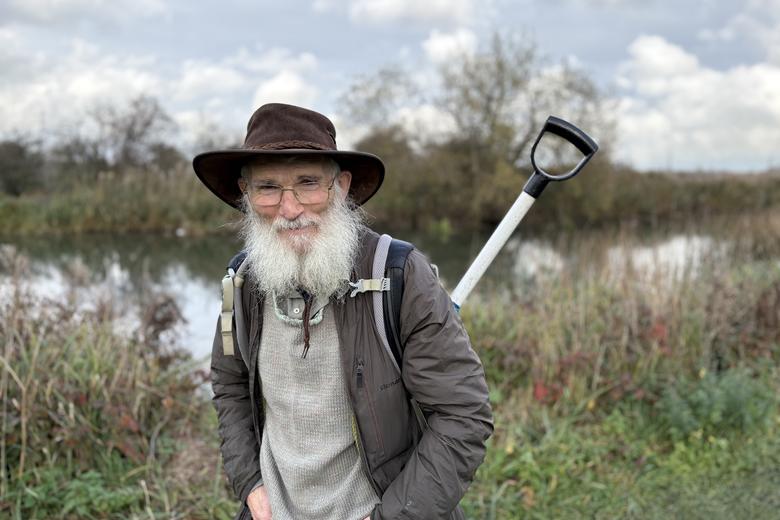MEETING GRETA, LAUNCHING HER NEW CLIMATE BOOK

MEETING GRETA, LAUNCHING HER NEW CLIMATE BOOK
Ahead of COP 27, Oxford authors cycled to London to co-launch a Greta Thunberg book about the climate crisis
Published: 9 November 2022
Author: Christian Brand
Share this article
On Sunday 30 October, Dr Christian Brand and colleague Dr Emilie Vrain cycled from Oxford to London to participate in the launch of a climate book they contributed to.
The Climate Book, published by Penguin, organised and launched by Swedish climate activist Greta Thunberg, includes a chapter about the future of transport written by Dr Brand – hence the cycling angle.
Christian is an Associate Professor at the University of Oxford, while Dr Emilie Vrain is a Senior Researcher, fellow cyclist and filmmaker.
The book has a hundred contributing authors and they all converged on the Royal Festival Hall in London, on 30 October.
Christian and Emilie’s bike ride (Christian pictured, right), he reports, was anything but easy with heavy rain and side winds, to say nothing of London drivers. It took them six hours in total to travel the 105 kms, but with no punctures.
‘But it was still worth it, not least for the reduced carbon footprint,’ he says.

He calculates that by car the one-way trip would have produced about 16 kg of CO2, and by train about 7 kg of CO2. By bike the total would be less than 2 kg of CO2.
They returned later by hybrid electric diesel train operated by First Great Western.
There are accepted metrics for how you calculate these estimates (note below), and cycling is not free of emissions on account of infrastructure provision, the footprint of the bike when it was manufactured, and the fuel – food.
Christian reports that Greta Thunberg gave a rousing speech and was interviewed about her life and the new book by British journalist and broadcaster Samira Ahmed. The book has received positive reviews so far, with the Independent declaring: ‘Welcome to Greta Thunberg’s zero-bulls*** revolution’, while The New Scientist called it ‘An essential guide to a better world.’
Swedish climate activist Greta Thunberg has declined to attend COP27, telling Ahmed during a question and answer session that the event in Egypt is a ‘scam’ that allows ‘greenwashing, lying and cheating’ to continue.
The COP26 transport day held in Glasgow last year on 10 November, focused primarily on electric cars; there was no mention of bicycling (or walking or trains), enforcing the perception that the most climate friendly transport mode besides walking has been inexplicably side lined in the face of large scale commercial forces pressing for the electrification of private cars instead.
Brand says, ‘We know that cycling is cheaper, healthier, better for the environment, and no slower on congested urban streets. It is a key part of the solution to decarbonise transport, but it won’t be enough. We pretty much have to do everything, and fast.’
He explains how he and science colleague and friend Jillian Anable ‘argue that tackling the climate and air pollution crises requires curbing all motorised transport, particularly private cars, as quickly as possible. Focusing solely on electric vehicles and technology that is not proven at scale is actually slowing down the race to zero emissions, as it diverts resources and political will away from other solutions. It is now widely agreed that there is no way we can meet the decarbonisation targets of the Paris Agreement by 2050 without focusing on the amount of movement of people and goods. In the UK, Scotland and Wales have traffic reduction targets by 2030, but the UK as a whole continues to ignore the issue.’

The problems sound completely insurmountable until you start to mull the suggested solutions, which include system level and individual actions.
Brand and Anable cover topics such as 15-minute neighbourhoods (so-called because they suggest that all vital services be within a fifteen-minute walk, to avoid constant car use); banning large SUVs in cities, active travel, car restraint, ‘slow steaming’ (whereby cargo ships deliberately go slower to reduce fuel burn) and elimination of all frivolous and ‘frequent’ flying.
Strikingly, says Brand, ‘the carbon footprint for daily travel is up to 84% smaller for people who walk or cycle than for people who use other modes of transport. Emissions from cycling can be more than 30 times lower for each trip than driving a fossil fuel car, and about ten times lower than driving an electric one.’
*Why cycling is not free from emissions. Cycling generates emissions from infrastructure provision, bike manufacturing and additional food consumption by the rider. Average lifecycle carbon emissions, from ITF report: Car 162 gCO2/passenger-km, coach/rail 66 gCO2/passenger-km, bike 17 gCO2/passenger-km.
The Climate Book by Greta Thunberg https://theclimatebook.org/the-book/
Dr Christian Brand is Associate Professor, and Co-Director, UK Energy Research Centre
Transport Studies Unit and Environmental Change Institute, University of Oxford: www.tsu.ox.ac.uk www.eci.ox.ac.uk
Picture credit: Christian Brand















